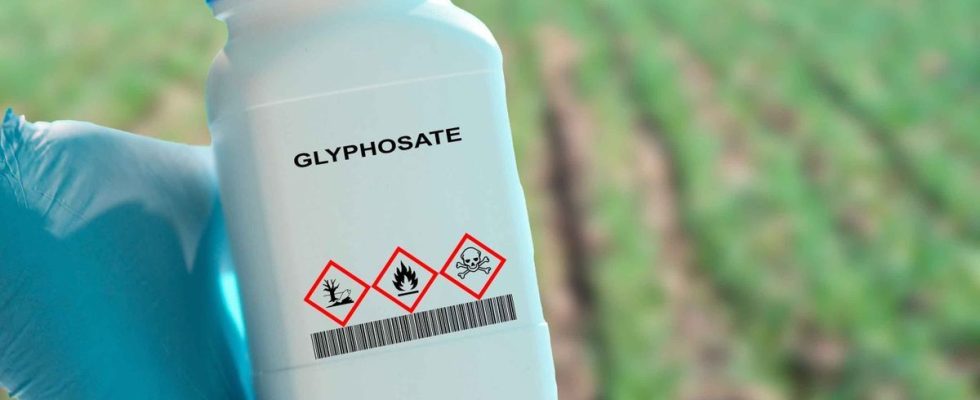Published on
Updated
Reading 3 min.
The European Commission confirmed on Thursday its decision to renew for ten years the authorization of glyphosate, a phytosanitary product which is creating controversy. Ten more years of health risks? Nadine Lauverjat, general delegate of the Générations Futures association, expressed her surprise to us and what leads, according to her, to such conclusions.
Despite the insufficient reluctance of France and Germany, the European Commission voted on November 16 to renew the authorization of glyphosate for an additional 10 years in Europe. The best-selling phytosanitary product in France has nevertheless been declared since 2015 by the International Center for Research on Cancer (Circ), “probably carcinogenic to humans“. A classification which according to a provision of the European regulation should not allow its continued use. And yet…
No sufficiently high health risks according to Europe
The European executive justifies its decision by a situation that is much less alarming than it seems. According to him, the results of the study by the European Food Safety Authority (EFSA) submitted in July do not justify a ban. The latter considers that the product does not present sufficiently high risks to health to prevent granting a new authorization.
“The assessment of the impact of glyphosate on human health, animal health and the environment has not identified any areas of critical concern” indicates the EFSA in its conclusions in July 2023.
A year earlier, the European Chemicals Agency (EChA) estimated that glyphosate “is neither carcinogenic, nor mutagenic, nor toxic for reproduction”. Of course, it concedes that the product can be dangerous for the eyes of users and aquatic organisms, but these two characteristics are not sufficient to lead to a rejection of the authorization request.
However, in France, Inserm expresses another, documented opinion. A scientific report published on June 30, 2021, as a summary of the health effects of pesticides, and commissioned by the French government, concludes that “the presumption of a link between glyphosate and NHL [lymphome non hodgkinien, soit un cancer du système lymphatique] is average”. In other words, Inserm recognizes that information on the carcinogenic risks of glyphosate exists…
Health risks avoided by the authorities
Concretely, in our everyday lives, what are the consequences for our health and our environment of such a decision? Nadine Lauverjat, general delegate of the Générations Futures association, enlightens us on the current facts.
“The impact on health is quite clear: there are known risks. But it is enough to compare French medical research versus the evaluation of the EFSA and the ECha to understand that there are big “gaps” between French and European issues. Inserm, which is not just any institute, has done remarkable work taking into consideration a large number of scientific research on the effects of glyphosate. But this same research has all been rejected by the EFSA and the EChA, because according to them, it does not meet the standards of university research.
Thus on genotoxicity and oxidative stress, Inserm takes into account 18 university studies and indicates that glyphosate can induce oxidative stress and genotoxic damage which can lead to the appearance of cancers. When the EFSA and the EChA retain… none.
Same thing for reprotoxic and endocrine disrupting effects. Inserm takes into account 21 university studies and emphasizes the endocrine disrupting potential of glyphosate. The EFSA and ESChA only retain one and consider that glyphosate has no endocrine effect.
Inserm also detects possible consequences on mitochondrial toxicity, epigenetic and transgenerational modes of action, the microbiota, neurotoxicity… when the agencies simply do not evaluate these areas.
“Regarding the environmental impact, it’s the same thing. We know that glyphosate pollutes the earth and is also found in water. But in the evaluations of European authorities, this research does not exist. This is a real aberration” laments Future Generations.
What about glyphosate in France today?
In France, the herbicide is no longer supposed to be spread in public spaces. The conditions of use by farmers have also been restricted since January 1, 2022: it is prohibited to treat a field that has already been plowed and the maximum doses have been reduced.
But can we go further if the restrictions are not the same among our neighbors? On this subject, the Ministry of Agriculture wanted to be reassuring: “In France, glyphosate will continue to be regulated: its use will always be authorized where there is no alternative, and the government, through the Ecophyto plan, will continue to look for alternatives and support farmers. he announces.
The use of glyphosate will therefore be reduced, perhaps. But it will always be present in France, as in Europe. Very effective and inexpensive, glyphosate is today the second pesticide consumed in France after sulfur.
